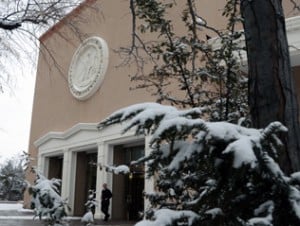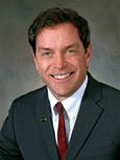
The Roundhouse in Santa Fe (Photo by Heath Haussamen)
Before I became involved in state politics, I was a registered Independent. I grew up in a Republican household, and the kinds of political divisions that we know so well play out in my own family. Wonderful, spirited discussions happen whenever we get together, and respectful dialogue was encouraged by my parents when we were growing up.
It is something deep in my being that expects the same kind of healthy debate in Santa Fe, doing what is expected of us as legislators.
I provide this kind of detail because I hear the word “bipartisan” invoked repeatedly these days: I even do it myself at neighborhood meetings. And on the national level it would seem more important than ever as the debt-ceiling looms. But how real is this bi-partisanship language of ours? Is it even possible when you are either pro-choice or pro-life; pro-health care reform or against; pro-domestic partnership or against?
The divisive list goes on, as we have to sadly acknowledge. I have a friend who insists that the “middle” has entirely vanished, that the days of conciliatory political agreements are gone.
When the governor spoke at an Albuquerque NAIOP meeting that I attended, I was heartened to hear her talk about bipartisanship. She gave less-than-convincing examples of her bipartisan efforts from our then recently concluded legislative session, which I admit is colored by my own partisan affiliation. But I was encouraged by the spirit of her remarks, and by the fact that she valued the subject enough to make it a major part of her speech.

Bill O'Neill
Can we find compromise on drivers’ licenses?
The simple definition of compromise in Webster’s New World Pocket Dictionary is a “settlement made with concessions.” Certainly this applies to the legislative process.
We have now learned that the governor is considering placing the drivers’ license issue before us once again at our upcoming special re-districting session. I am probably in the minority on my side of the aisle, but this could present an opportunity to finally resolve the issue, depending on whether the governor is serious about realistic governance and bipartisanship. It could also help silence those critics who say that she is more interested in campaigning than governing.
How could she do this? By exhibiting a willingness to address the public safety concerns about having unlicensed, uninsured motorists on our highways, which was the purpose of the 2003 law in the first place. Drivers’ licenses are not, and never have been, designed to be documents proving citizenship. Instead, they are meant to protect citizens from untrained, uninsured motorists. They also provide law enforcement the means to identify motorists and to keep track of their driving records, and to encourage drivers to stay at the scene of accidents rather than fleeing.
These are legitimate public safety concerns and deserve serious debate and consideration.
A fork in the road
As a state legislator directly involved in the progress of several different bills on the drivers’ license issue this past session, including my own, I found it curious that the Governor’s Office did not appear to be interested in any “provisional license” approach to this emotional issue. Of course, provisional licenses present their own set of problems, but why was this not at least part of the discussion driven by the governor this past session?
Come September, the message could be clear for the rest of her term: The governor can continue to use the Nuñez bill as a campaign tool, building a wedge issue for the next election, or she can exhibit her willingness to consider other options, and in so doing place responsibility on legislators from both parties to respond in kind.
If the governor insists on placing this issue before the special session, then the conversation and process to find a reasonable solution should begin now. Without compromise, the disturbing problem of fraud in the issuing of drivers’ licenses will remain largely unresolved.
It would seem to be a fork in the road – at least for this state lawmaker.
O’Neill, a Democrat, represents District 15 in the New Mexico House.
